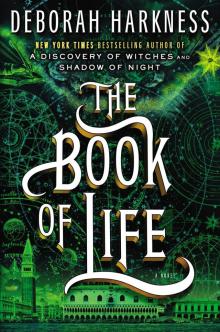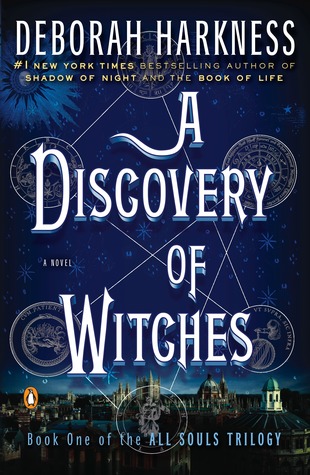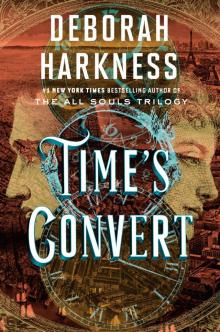- Home
- Deborah Harkness
Time's Convert Page 30
Time's Convert Read online
Page 30
Marcus filed Fanny’s wisdom away for future use, shifting on the edge of the bin to give himself more room.
“So. Tell me your news. How did it go with Far?” Fanny fixed her frosty blue eyes on Marcus.
Marcus had no idea who Far was. He shrugged. Fanny’s expression turned sympathetic.
“Give Philippe time.” Fanny reached over and patted him on the knee. “Once Father has figured out what use you are to him, and given you names, he will thaw. Until then, you will stay with me. I will teach you how to be a wearh—and do a far better job than Matthew would have done. Even Far will be astonished at what I have achieved.”
Marcus bit back a sigh of relief. He wasn’t sure Fanny would make a better parent, but he was confident she would make his education a more interesting—not to mention pleasurable—experience.
* * *
—
FANNY EMBRACED THE CHALLENGE of Marcus’s education with enthusiasm, supplying him with dancing and fencing masters, French and Latin tutors, a tailor, and a wigmaker. Marcus’s days were filled with appointments, his nights with reading and writing.
Still, Fanny fretted about how Marcus might develop, and aspired to do everything she could to see him become a credit to the family.
“We must occupy your mind with new experiences, Marcus,” Fanny declared one night. “Otherwise you might slip into ennui and come out jaded like my sister Stasia. Do not worry. I have sent a message to a friend. She will have marvelous ideas about how to perfect you.”
Stéphanie Félicité du Crest de Saint-Aubin, Comtesse de Genlis, received Fanny’s cry for help and left the opera at once to lend assistance. She arrived like a spring sunset, swathed in lavender and blue silk, sparkling with tinsel braid, and topped with a powdered, puffed wig that resembled clouds. The comtesse peered at Marcus through a pair of spectacles worn around her neck on a sky-blue ribbon.
“A remarkable creature,” she pronounced in perfect English, once her examination was complete.
“Yes, but he is still an infant,” Freyja said sadly. “We must spare no effort in preparing Monsieur Marcus to meet his grandfather, Stéphanie. You will move in—straightaway.”
Together, Fanny and Madame de Genlis poked and prodded him, firing off questions and comments so rapidly in English (the questions) and French (the comments) that Marcus couldn’t keep up. Marcus stopped trying to anticipate whether the next topic would be his experience with women (tragically limited, they agreed), his education (shockingly poor), or his manners (quaintly old-fashioned, but really he must stop bowing to servants).
“It is a very good thing Le Bébé doesn’t require sleep,” Madame de Genlis commented to Fanny. “If we work night and day, he might be ready to meet your father le comte at midsummer.”
“We do not have six months, Stéphanie,” Fanny said.
“You will be lucky to have six days” was Françoise’s dour prediction.
“Six jours!” Madame de Genlis was appalled. “Françoise, you must do something! Talk to Madame Marthe. She will get Philippe and Ysabeau out of Paris. Perhaps they could go to court?”
“Ysabeau hates Versailles. Besides, news travels between Paris and the palace too quickly,” Fanny fretted.
“Surely they would enjoy spending the winter months in Blois, or even at Sept-Tours? You could suggest it, Fanny,” Madame de Genlis insisted.
“Father would know I was up to no good,” Fanny said. “No, Stéphanie, we must be brave and ruthless, and teach Le Bébé all we can as quickly as we can. The fear of discovery will sharpen our focus and enliven us to new possibilities. Energy and persistence will conquer all obstacles, as Dr. Franklin says!”
Marcus’s days and nights passed in a dizzying whirl of activity. He didn’t much care for the Latin, the French, or the dancing lessons. The fencing lessons were better. But his favorite moments were discussing politics and philosophy in Fanny’s opulent library. Marcus had never seen so many books in one place. Madame de Genlis was quick-witted and well-read, which meant that Marcus had to work hard to keep up with her, even when the subject of their conversation was Thomas Paine. But it was their outings into the city streets that Marcus loved above all else.
“Paris is the best teacher,” Madame de Genlis proclaimed as they crossed over the Seine and into the narrow, twisting thoroughfares of the Île de la Cité.
Together, they watched cows being butchered and the prostitutes in Madame Gourdan’s brothel taking their afternoon ablutions. Fueled by his unfulfilled desire for Françoise, they spent a glorious morning amid the bateaux-lavoirs on the Seine, drinking in the heady scents of starch and soap and giving washerwomen a few sous in exchange for a cup of their blood. Gunpowder was next, after they stumbled across a tense duel while hunting at dawn in the Bois de Vincennes. Print shops followed, the damp pages and tang of the ink drawing Marcus like iron filings to a magnet.
Though Marcus had seen a few news sheets roll off the presses in Philadelphia, Paris’s booksellers operated on an entirely different scale. Books in French, Latin, Greek, English, and languages Marcus couldn’t recognize were typeset in wooden racks. Sometimes the metal letters were still glistening with ink from their previous jobs. Then it was off to the press to be aligned, inked, and imprinted. Reluctantly, Marcus handed over his copy of Common Sense to a bookbinder so that it could be kept from falling apart. He watched the man select the stiff backing for the new leather cover and paste fresh paper down to protect the worn contents. When the bookbinder returned it, now wrapped securely in brown leather stamped with gold, Marcus held in his hands a volume that would not be out of place in the finest of libraries.
Marcus was so entranced by the world of books that Fanny paid a beefy printer with a daughter in need of a dowry half a year’s earnings so that he could drink his blood and imbibe a truer sense of what it was to be involved in the book trade.
“Alors. It was an experiment,” Madame de Genlis said with a tinge of disappointment after Marcus confessed that most of what he’d seen in the man’s blood concerned his wife—a real harridan, if he were to be brutally honest—and his futile efforts to get out of debt.
“We shall try again,” Fanny said, unfazed by failure.
Nothing was off-limits to him so far as Fanny and Madame de Genlis were concerned—even though Marcus’s keen sense of smell led him around by the nose, as Gallowglass had feared. He found the scent of young women irresistible.
“I know just the place to go,” Fanny confided to Madame de Genlis. “A brothel where the women are young and enthusiastic.”
Then Marcus smelled something even more enticing than a woman.
“Stop. What is that?” Marcus discovered he could slow Fanny’s progress by planting his feet so firmly on the street that his shinbone cracked under the stress.
“The Hôtel-Dieu.” Madame de Genlis pointed to a vast, fire-scarred building stretched along the banks of the Seine in the shadow of Notre-Dame cathedral. Parts of it had collapsed. The rest of it looked like it might tumble into the river at any moment.
“Hotel?” Marcus asked.
“The hospital,” she replied.
“I want to go inside,” Marcus said.
“Just like his father.” Fanny looked disappointed at Marcus’s decision to leave off his pursuit of women in favor of death and disease, but then her face brightened. “Perhaps there is something to be learned from the similarity? What do you think, Stéphanie?”
Aromas of camphor, lint, coffee, and spices assaulted Marcus’s nose when he entered, followed by the sweet smell of decay and darker notes of opium and death. He drank it in, along with layers of copper and iron scent.
So much blood, he realized, each person’s subtly different.
Marcus trailed through the wards, using his nose—that powerful part of the vampire body—rather than a manual examination to diagnose illnesses and patients�
�� conditions.
The hospital was enormous—larger even than Philadelphia’s Bettering House, or the hospital the army had occupied in Williamsburg—and night had fallen before he was through exploring. By then, Marcus’s coat was stained with blood and vomit—he hadn’t been able to ignore the patients’ pleas for water and care. He was also ravenous, and wanted to go to a tavern and order a pint of beer and a piece of well-seasoned beef, even though he knew it would no longer satisfy his hunger.
He got Josette instead.
* * *
—
MARCUS WAS IN THE LIBRARY the next morning, conjugating Latin verbs, when there was a commotion in the front hall.
A petite woman burst into the room, followed by Fanny’s footman, a strange-looking fellow named Ulf whose arms were too long for the rest of his body. Trailing behind was another small, elegant female.
A wearh.
“You see! There he is!” the woman cried, clasping a folded piece of paper to her breast. She was draped in yards of red-and-white-striped silk and wore a redingcote along with a ridiculously tiny cocked hat set on her powdered wig at a jaunty angle. The woman was childlike in her appearance, with small features. “He is just as my Gilbert described, is he not? I knew him the moment I spotted him from my carriage, entering the Hôtel-Dieu.”
The female wearh inspected Marcus through a filmy veil that floated from the brim of her hat and covered her piercing green eyes.
“Madame de Clermont, Madame la Marquise, let me call—” Ulf said, flapping his large hands in consternation.
“Ysabeau!” Fanny arrived in a whirl of pale blue and green. She was followed at a more sedate pace by Madame de Genlis, who continued to sport the colors of the Revolution and was today dressed in naval blue with golden braid. A model of a ship in full sail was pinned to her wig in lieu of a hat.
“And the Marquise de Lafayette.” Madame de Genlis swept her skirts into one hand and curtseyed. “What brings us this honor?”
Marcus stared at his former patient’s wife. She did not look old enough to have a husband, but then again, Lafayette hadn’t seemed mature enough to be a husband, either.
“I came to thank my husband’s savior.” Adrienne rushed at Marcus, her lips pursed to bestow kisses on him.
“Please, madame. There is no need—” Marcus’s protests were cut off by an enthusiastic embrace.
“How will I ever repay your kindness?” Adrienne wept into his coat, clinging to him for dear life. “Your skill as a physician? Your—”
“I have come to see my grandson,” the veiled woman interrupted, clearly out of patience with Adrienne’s effusiveness. She lifted the scrap of fabric, revealing her face. It was perfectly formed and exquisitely beautiful, but there was a ferocity to her features that would warn any prudent warmblood to stay away.
“Grandmother?” Marcus whispered, taking a step in her direction.
“Marcus is not yet ready—” Fanny began.
A cold glance stopped her.
“If you insist,” Fanny said smoothly, though Marcus could hear that her heart was beating more quickly than usual. “Marcus, this is Ysabeau de Clermont, Matthew’s maker—and your grandmother.”
His grandmother. Marcus’s blood beat out a staccato tattoo of pride and respect. He took one step toward her, then another.
Marcus studied his grandmother as he did, intrigued by the affinity he felt for this stranger. He was struck by the beauty of her face and features, the sharp delicacy of her bones, and the blue-tinged porcelain quality of her skin. Her eyes were the color of jade, and so penetrating that they seemed to flay Marcus to the bone. Her dress was a froth of creamy silk, but the layers of fabric wrapped and puffed around her slender frame did nothing to diminish the woman’s presence. Ysabeau de Clermont was powerful—and powerfully intelligent.
Marcus couldn’t stop himself. He bowed. His grandmother was the finest lady he had ever encountered. Adrienne cooed and clapped in approval, wiping a tear from her eye at the touching domestic scene unfolding in Fanny’s front hall.
Cold, delicate hands touched him on the shoulders, a quiet command to rise.
“Yes. You are Matthew’s son,” Ysabeau said, her eyes holding his. “I hear his bloodsong in your veins. This will fade in time, as you become your own creature. But you are still too young for such independence. It is important that vampires understand who you are until you can protect yourself.”
“Vampire?” Marcus looked to Fanny in confusion.
“We do not use that old-fashioned word ‘wearh’ anymore,” Fanny explained. “Vampire is fresh—modern.”
“It matters little what you are called,” Ysabeau said, her voice dismissive. “All that is important is who you are: Matthew’s son—and a de Clermont.”
23
Thirty
12 JUNE
“Do you have your phone?”
“Yes, Miriam.” Phoebe waited by the window, impatient for her first glimpse of their visitor.
“And some money?”
“In my pocket.” Phoebe patted the hip of her jeans, where a mixture of small bills (for taxis) and large bills (for bribes) was neatly folded.
“And no ID?” Miriam said.
The need to go out hunting without any identification, in case the unimaginable happened and someone was killed, had been drummed into Phoebe.
“Nothing.” Phoebe had even taken off the diamond key her parents had given her on her twenty-first birthday in case the stones were registered and could somehow be traced back to her. The emerald ring that Marcus had slipped on her finger when they were engaged remained where he had put it, however.
“Stop gawping at the window,” Miriam said, sounding peevish.
Phoebe tore herself away from the view of the street. She would be out there soon enough.
She was going for a walk.
In Paris.
At night.
With Jason.
He was a member of Miriam’s family—now Phoebe’s family—a male, and the son of Miriam’s former mate.
Tonight marked Phoebe’s next step in becoming an independent vampire. The significance of this rite of passage had been impressed upon her by every member of the household, including Freyja’s driver, who had taken Phoebe for a ride along the same streets she would be traveling tonight on foot. Miriam told her that if all went as planned, Phoebe might be allowed to hunt with Jason, though not to feed. She was not yet mature enough for that.
Given that incentive, Phoebe was determined to succeed. She’d pored over the arrangements, rehearsed every moment of going out into the city in the privacy of her room, and felt ready for any eventuality.
A knock sounded at the door.
Phoebe practically leaped into the air with excitement. She was about to meet a member of her new family. Françoise gave her a stern look when it seemed as though Phoebe herself might rush to the door and fling it open. Phoebe stilled her feet, folded her hands before her, and waited in Freyja’s salon.
This act of self-control earned her a slightly approving glance from Miriam, and a small smile from Françoise as she left to see to their visitor.
“Milord Jason,” Françoise said. A wave of unfamiliar scent washed over Phoebe: fir and the dark scent of mulberries. “Serena Miriam is in the salon.”
“Thank you, Françoise.” Jason’s voice was low and pleasing, accented in a way that Phoebe—traveled as she was—had not heard before.
When he entered the room, Jason pinned his hazel eyes on Miriam. He ignored Phoebe completely, walking past her without a second glance. Jason was about Marcus’s height—perhaps an inch shorter—and of a similarly compact, muscular build.
“Miriam.” Jason kissed Phoebe’s maker on both cheeks. The greeting was respectful and affectionate, but by no means warm.
“Jason.” Miriam stud
ied her mate’s son. “You look well.”
“As do you. Motherhood suits you,” Jason replied drily.
“I’d forgotten how hard it is to raise a vampire,” Miriam said with a sigh. “Phoebe, this is Bertrand’s son Jason.”
Jason turned toward Phoebe as if noticing her presence for the first time. Phoebe stared at him with open curiosity even though she knew this was the height of rudeness. She took in his open, honest expression, the slight bump on the bridge of his nose, the streaks of gold in his brown hair.
“Forgive her. She’s still a child,” Miriam said disapprovingly.
Phoebe remembered that she was supposed to be good and bit back a defensive retort. Instead, she extended her hand. Phoebe had been imagining this moment for days. She knew it would not be possible to walk toward him—she might run him over in her excitement. Even so, could she behave like a human, and simply shake hands without crushing Jason’s fingers?
Jason stood before her, eyes slightly narrowed in appraisal. Then he whistled.
“For once in his life, Marcus didn’t exaggerate,” he said softly. “You are as beautiful as he promised.”
Phoebe smiled. Her hand was still extended. She lifted it slightly. “Pleased to meet you.”
Jason took her hand, raised it to his lips, and pressed a kiss upon her fingers.
Phoebe withdrew her hand as if she’d been slapped.
“You’re supposed to shake it, not kiss it.” Phoebe’s voice trembled with fury, though she didn’t know why the innocent gesture angered her so.
Jason stepped back, a grin on his face and both hands raised in a gesture of surrender.
Once the tension in the hall subsided, Jason spoke.
“Well, Miriam, she didn’t accept my overture, nor did she strike me, bite me, or run out the open door.” Jason nodded with approval. “You’ve done well.”
“Phoebe has done well,” Miriam said, her voice tinged with something Phoebe had not heard in it before. Pride.

 The Book of Life
The Book of Life Shadow of Night
Shadow of Night A Discovery of Witches
A Discovery of Witches The All Souls Real-Time Reading Companion
The All Souls Real-Time Reading Companion Time's Convert
Time's Convert The World of All Souls
The World of All Souls A Discovery of Witches: A Novel (All Souls Trilogy)
A Discovery of Witches: A Novel (All Souls Trilogy) Shadow of Night: A Novel
Shadow of Night: A Novel